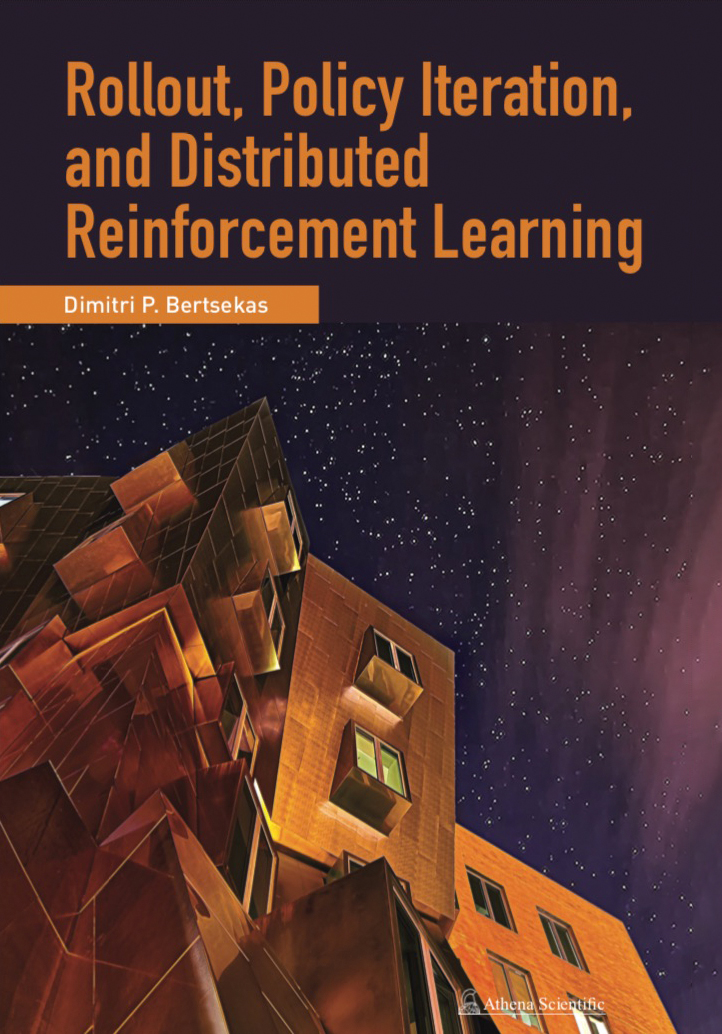ISBN: 978-1-886529-07-6
Publication: 2020, 376 pages, hardcover
Price: $49.00
AVAILABLE
Video Course from ASU, and other Related Material

The purpose of this book is to develop in greater depth some of the methods from the author's Reinforcement Learning and Optimal Control recently published textbook (Athena Scientific, 2019). In particular, we present new research, relating to systems involving multiple agents, partitioned architectures, and distributed asynchronous computation. We pay special attention to the contexts of dynamic programming/policy iteration and control theory/model predictive control. We also discuss in some detail the application of the methodology to challenging discrete/combinatorial optimization problems, such as routing, scheduling, assignment, and mixed integer programming, including the use of neural network approximations within these contexts.
The book focuses on the fundamental idea of policy iteration, i.e., start from some policy, and successively generate one or more improved policies. If just one improved policy is generated, this is called rollout, which, based on broad and consistent computational experience, appears to be one of the most versatile and reliable of all reinforcement learning methods. In this book, rollout algorithms are developed for both discrete deterministic and stochastic DP problems, and the development of distributed implementations in both multiagent and multiprocessor settings, aiming to take advantage of parallelism.
Approximate policy iteration is more ambitious than rollout, but it is a strictly off-line method, and it is generally far more computationally intensive. This motivates the use of parallel and distributed computation. One of the purposes of the monograph is to discuss distributed (possibly asynchronous) methods that relate to rollout and policy iteration, both in the context of an exact and an approximate implementation involving neural networks or other approximation architectures.
Much of the new research is inspired by the remarkable AlphaZero chess program, where policy iteration, value and policy networks, approximate lookahead minimization, and parallel computation all play an important role.
This book relates to several of our other books: Reinforcement Learning and Optimal Control (Athena Scientific, 2019), Neuro-Dynamic Programming (Athena Scientific, 1996), Dynamic Programming and Optimal Control (4th edition, Athena Scientific, 2017), Abstract Dynamic Programming (2nd edition, Athena Scientific, 2018), and Nonlinear Programming (3rd edition, Athena Scientific, 2016).
The mathematical style of this book is somewhat different than the Neuro-Dynamic Programming book. While we provide a rigorous, albeit short, mathematical account of the theory of finite and infinite horizon dynamic programming, and some fundamental approximation methods, we rely more on intuitive explanations and less on proof-based insights. Moreover, our mathematical requirements are quite modest: calculus, a minimal use of matrix-vector algebra, and elementary probability (mathematically complicated arguments involving laws of large numbers and stochastic convergence are bypassed in favor of intuitive explanations).
Among its special features, the book:
Presents new research relating to distributed asynchronous computation, partitioned architectures, and multiagent systems, with application to challenging large scale optimization problems, such as combinatorial/discrete optimization, as well as partially observed Markov decision problems.
Describes variants of rollout and policy iteration for problems with a multiagent structure, which allow the dramatic reduction of the computational requirements for lookahead minimization.
Establishes a connection of rollout with model predictive control, one of the most prominent control system design methodology.
Expands the coverage of some research areas discussed in the author?s 2019 textbook Reinforcement Learning and Optimal Control.
Dimitri P. Bertsekas is Fulton Professor of Computational Decision Making at the Arizona State University, McAfee Professor of Engineering at the Massachusetts Institute of Technology, and a member of the prestigious United States National Academy of Engineering. He is the recipient of the 2001 A. R. Raggazini ACC education award and the 2009 INFORMS expository writing award. He has also received 2014 ACC Richard E. Bellman Control Heritage Award for "contributions to the foundations of deterministic and stochastic optimization-based methods in systems and control," the 2014 Khachiyan Prize for Life-Time Accomplishments in Optimization, the SIAM/MOS 2015 George B. Dantzig Prize, and the 2022 IEEE Control Systems Award. Together with his coauthor John Tsitsiklis, he was awarded the 2018 INFORMS John von Neumann Theory Prize, for the contributions of the research monographs "Parallel and Distributed Computation" and "Neuro-Dynamic Programming".
The following papers and reports have a strong connection to material in the book, and amplify on its analysis and its range of applications.